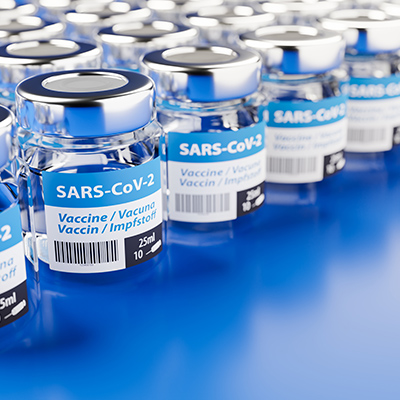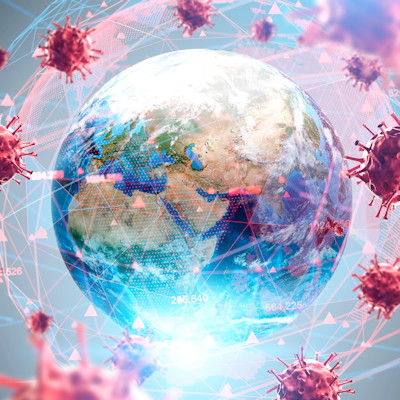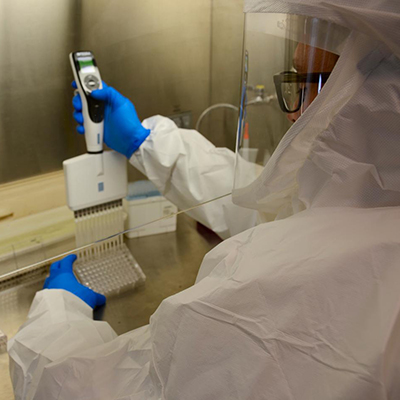May 4, 2020 -- Based on previous research that explored therapies against SARS-CoV, a new report has identified a fully human monoclonal antibody (mAb) that prevents the SARS-CoV-2 virus from infecting cultured cells. Authored by a team of researchers from Utrecht University, Erasmus Medical Center, and Harbour BioMed, the report was published in Nature Communications on May 4.
Monoclonal antibodies that target vulnerable sites on the surface of viruses hold promise as a potent class of drugs against infectious diseases. Coronavirus-neutralizing antibodies primarily target the trimeric spike glycoprotein on the viral surface, the protein that mediates entry into host cells.
The S protein has two functional subunits that are necessary to facilitate the viral entry. The first subunit, S1, contains four core domains (S1A-S1D) and mediates cell attachment. The second subunit, S2, enables fusion of the viral and cellular membranes. In the case of coronaviruses, neutralizing antibodies often target the receptor interaction site in S1, thereby disabling receptor interactions.
Cross-reactivity
With 77.5% primary amino acid sequence identity between the spike protein of SARS-CoV-2 and SARS-CoV, and with both commonly binding to the human angiotensin-converting enzyme 2 (ACE2) protein as a host receptor through their S1B domains, the researchers identified a human monoclonal antibody that neutralizes both in cell culture.
"This research builds on the work our groups have done in the past on antibodies targeting the SARS-CoV that emerged in 2002/2003," said Berend-Jan Bosch, PhD, senior author of the report and associate professor at Utrecht University, in a statement. "Using this collection of SARS-CoV antibodies, we identified an antibody that also neutralizes infection of SARS-CoV-2 in cultured cells. Such a neutralizing antibody has potential to alter the course of infection in the infected host, support virus clearance, or protect an uninfected individual that is exposed to the virus."
To identify SARS-CoV-neutralizing antibodies with cross-reactivity in SARS-CoV-2, the researchers used enzyme-linked immunosorbent assay (ELISA) to analyze a collection of SARS S proteins from immunized transgenic mice. Out of the 51 SARS-S supernatants, four showed cross-reactivity with the SARS-CoV-2 S1 subunit and one (47D11) exhibited cross-neutralizing activity of a pseudotyped RNA virus (viral vector with SARS-CoV and SARS-CoV-2 viral envelope). This antibody was then reformatted to a fully human immunoglobin (IgG1) for further classification.
Unique neutralizing target
The human 47D11 antibody was found to bind to cells expressing the full-length spike proteins of SARS-CoV and SARS-CoV-2. Moreover, it potently inhibited infection of VeroE6 cells with luciferase-encoding RNA viral particles pseudotyped with spike proteins of SARS-CoV and SARS-CoV-2. The antibody targeted the S1B receptor binding domain of both viruses with similar affinities.
Interestingly, the data showed that 47D11 does not neutralize SARS-CoV and SARS-CoV-2 by receptor-binding interference but through a yet unknown mechanism. Potent neutralizing antibodies often target this domain, but due to sequence variation of this region, they are also frequently virus-specific and neutralize related viruses poorly. The cross-reactivity of 47D11 suggests that it likely targets a more conserved region of the core structure of the S1B subunit.
Binding of this monoclonal antibody farther away from the receptor-binding interface opens the possibility for combination treatments with noncompeting, potent neutralizing antibodies that target the receptor-binding subdomain.
"This cross-neutralizing feature of the antibody is very interesting and suggests it may have potential in mitigation of diseases caused by future-emerging related coronaviruses," Bosch said.
Do you have a unique perspective on your research related to infectious diseases or virology? Contact the editor today to learn more.
Copyright © 2020 scienceboard.net









